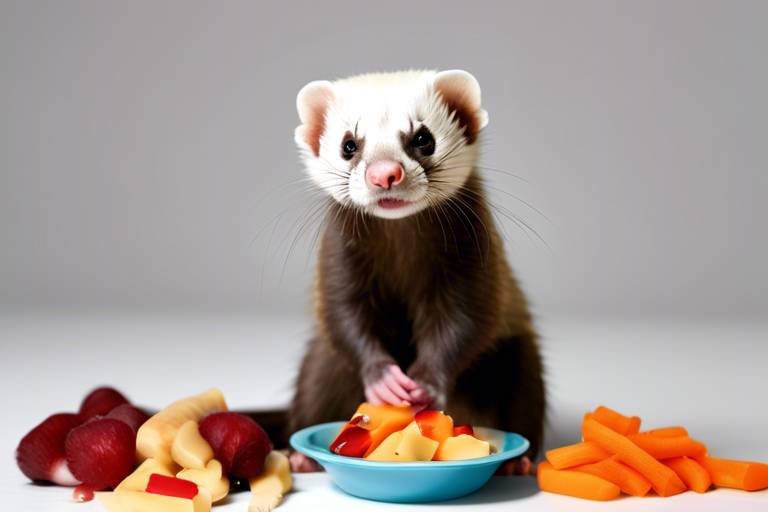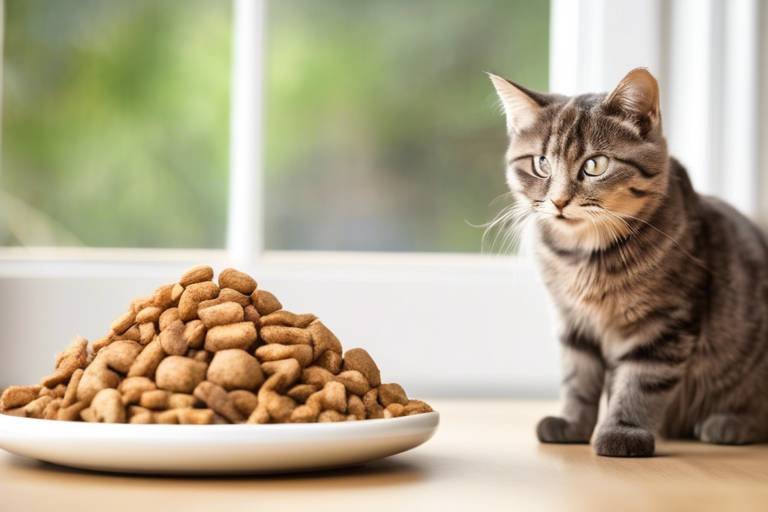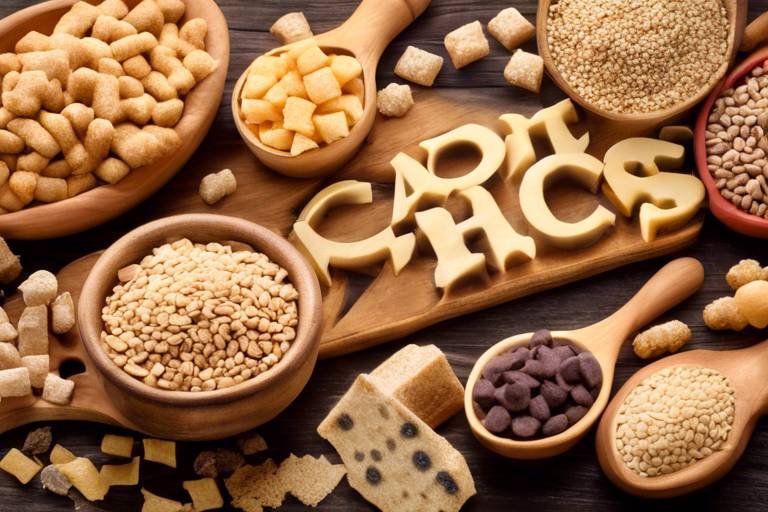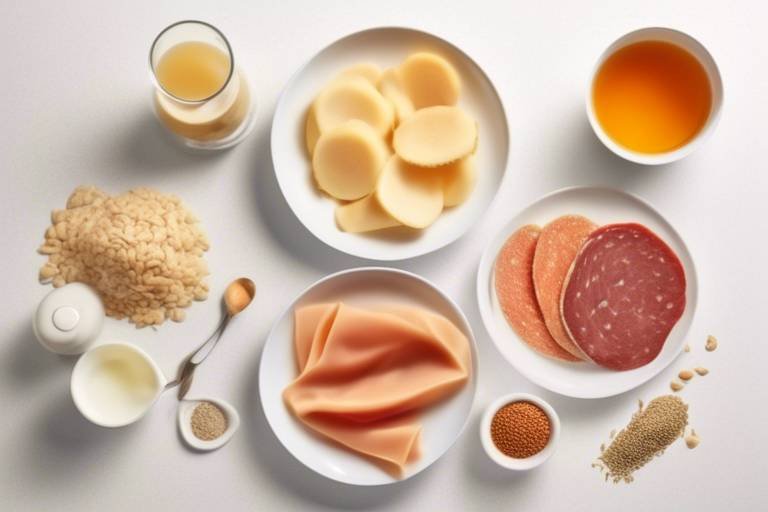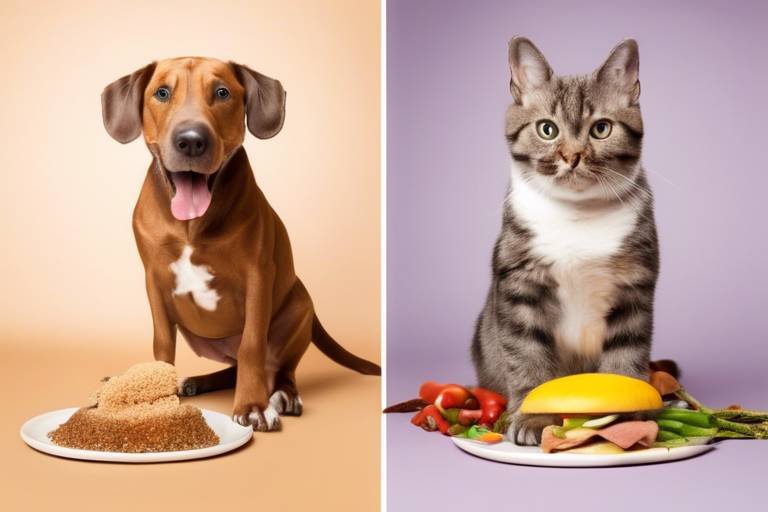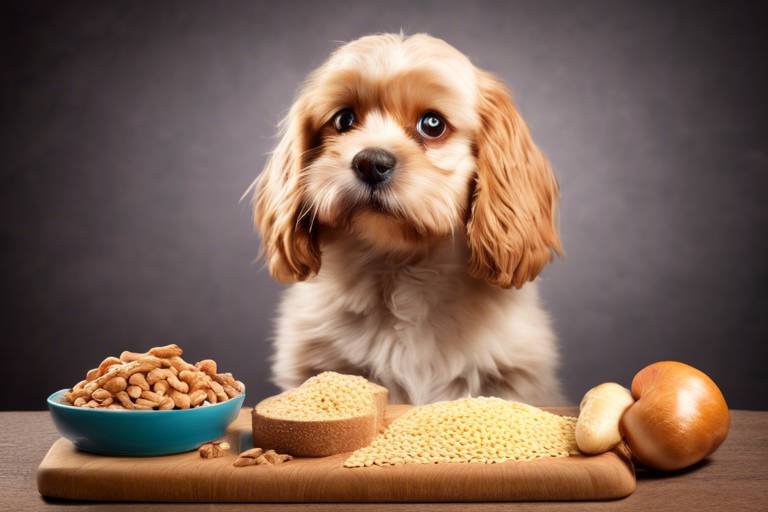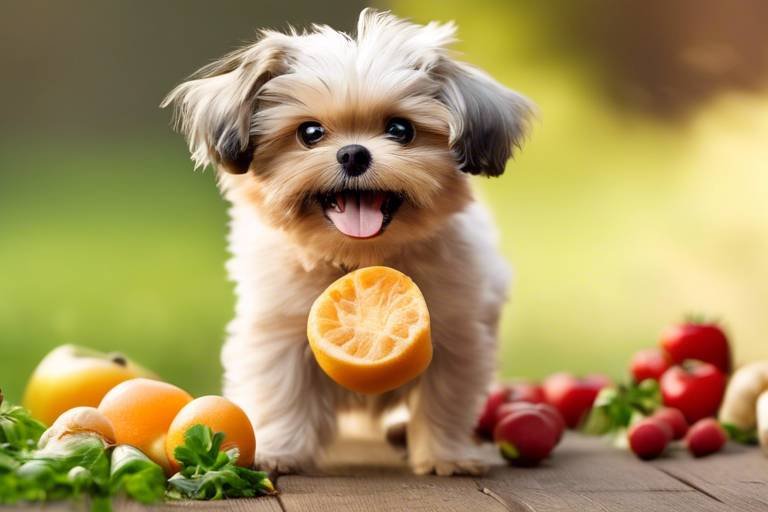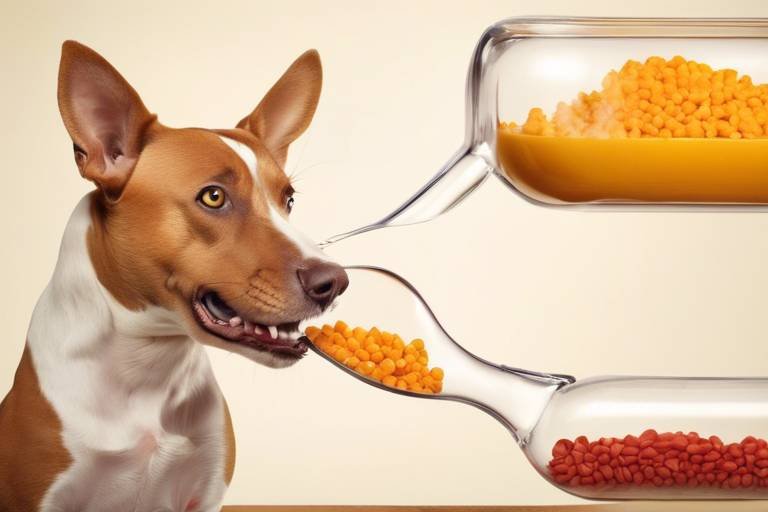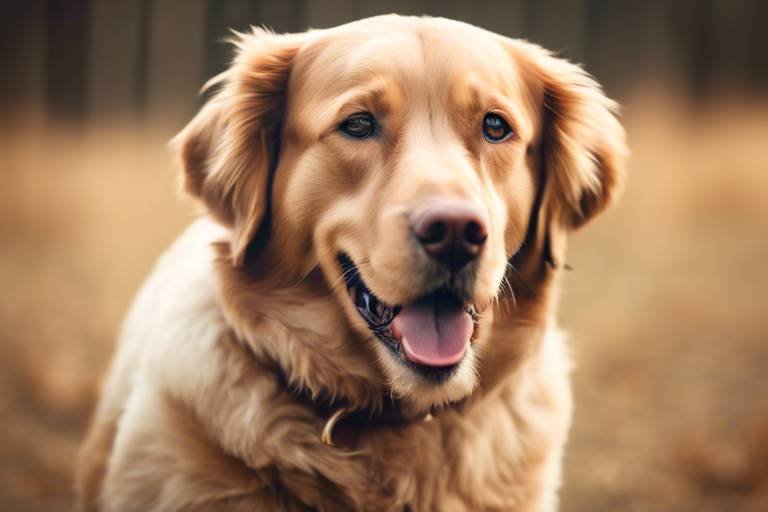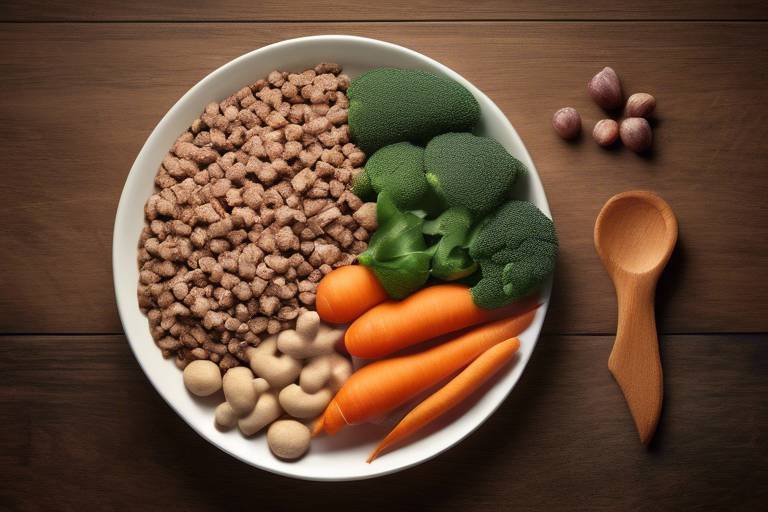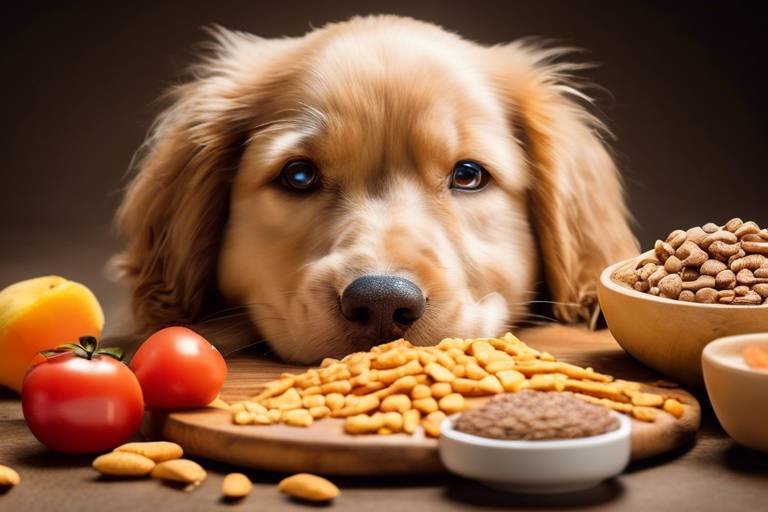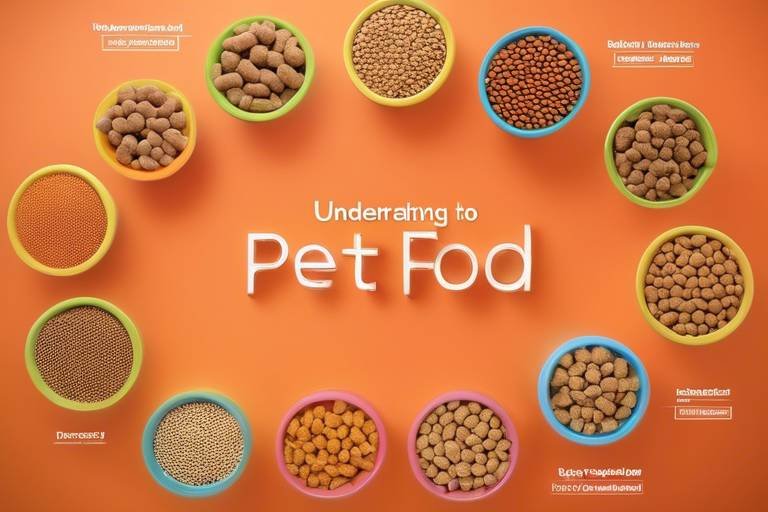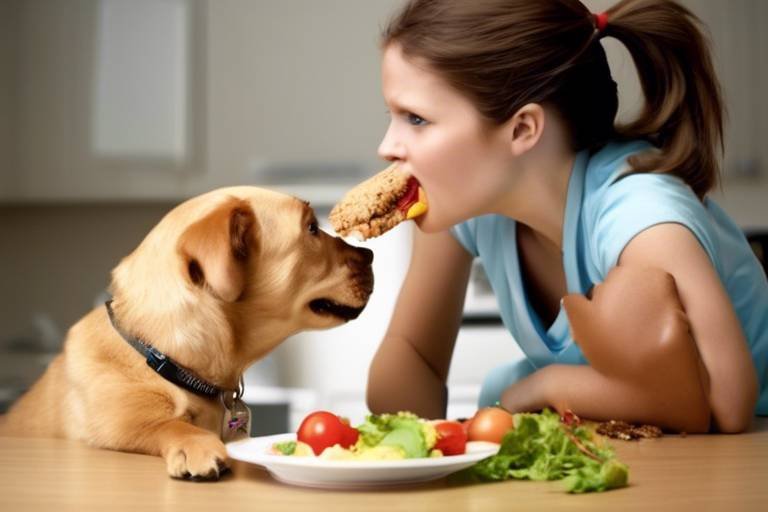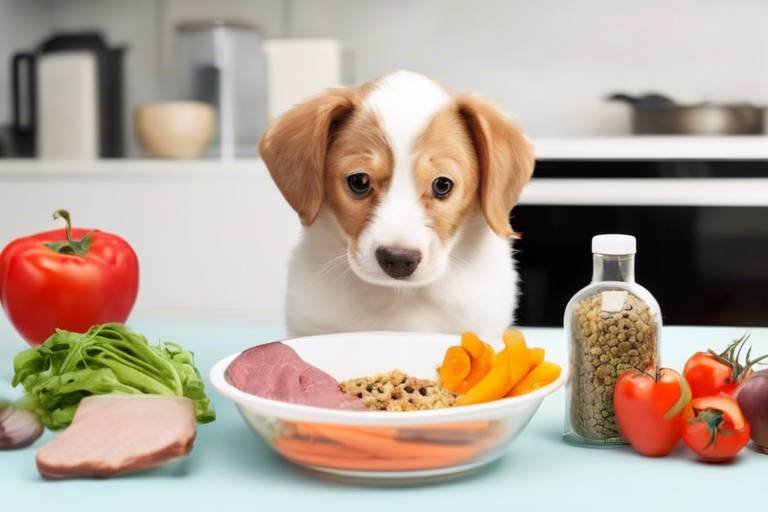Understanding the Risks of Feeding Pets Human Food
Feeding our furry companions can be one of the most heartwarming experiences we share with them. However, it’s crucial to understand that not all food that’s safe for us is safe for our pets. While it may seem harmless to share a bite of your sandwich or a piece of your pizza, the reality is that many common human foods can pose serious health risks to animals. Imagine treating your pet to a delectable morsel, only to find out later that it could lead to dire consequences. This article delves into the potential dangers of feeding pets human food, including health risks, nutritional imbalances, and alternatives that ensure your furry friends remain healthy and happy.
Many human foods can be toxic to pets, and it's essential to be aware of these dangers. For instance, chocolate is a well-known hazard; it contains substances called theobromine and caffeine, which can be lethal to dogs. Grapes and raisins are another surprising culprit, as they can cause kidney failure in dogs, even in small amounts. Here’s a quick rundown of some foods you should always keep away from your pets:
- Chocolate - Can cause vomiting, diarrhea, and even seizures.
- Grapes and Raisins - Can lead to acute kidney failure.
- Onions and Garlic - Can damage red blood cells and cause anemia.
- Avocado - Contains persin, which can be harmful to pets.
These are just a few examples, but the list goes on. It's essential for pet owners to educate themselves about the dangers of human food to avoid unintended consequences.
Feeding pets human food can lead to nutritional deficiencies that might not be immediately apparent. While it’s easy to think that sharing our meals can be a treat for our pets, it can actually result in a diet lacking in essential nutrients. Pets require specific vitamins and minerals that are often not present in our food. For instance, dogs need a balanced ratio of proteins, carbohydrates, fats, vitamins, and minerals to thrive. If they’re fed human food regularly, they might miss out on crucial nutrients, leading to health issues over time.
A balanced diet is vital for pets, just like it is for humans. It ensures that they receive all the nutrients they need to live a healthy life. Think of it this way: if you were to eat only pizza every day, you’d eventually feel the effects of a poor diet. The same goes for our pets. Feeding them a diet specifically formulated to meet their unique nutritional needs is essential for their overall health and well-being.
Different pets have different nutritional requirements. For example, dogs are omnivores and can thrive on a variety of foods, while cats are obligate carnivores and need a diet high in protein. Understanding these needs is crucial for pet owners. Here’s a quick breakdown:
| Pet Type | Nutritional Needs |
|---|---|
| Dogs | Balanced diet with proteins, fats, carbohydrates, vitamins, and minerals. |
| Cats | High protein diet with specific amino acids like taurine. |
By recognizing these differences, pet owners can make informed feeding choices that cater to their pet’s specific needs.
When comparing commercial pet food and human food, it becomes clear why commercially prepared diets are often better suited for pets. Commercial pet foods are formulated to provide the necessary nutrients without harmful ingredients that can be found in human meals. They are designed to meet the unique dietary requirements of pets, ensuring they get everything they need for a healthy life.
Recognizing the signs of food-related health issues is vital for pet owners. If your pet is experiencing any of the following symptoms, it may indicate a food-related problem:
- Vomiting or diarrhea
- Loss of appetite
- Excessive thirst
- Unusual lethargy
Being vigilant about these signs can help catch issues early, potentially saving your pet from serious health complications.
Fortunately, there are many safe and healthy alternatives to human food for pets. Instead of sharing your meals, consider incorporating suitable snacks and treats that can be enjoyed without the associated risks. For example, carrots, apples (without seeds), and plain cooked chicken can be great additions to your pet's diet.
Making homemade pet treats can be a fun and healthy alternative. Not only do you know exactly what goes into them, but you can also tailor them to your pet's dietary needs. Here’s a simple recipe to get you started:
Ingredients:
- 1 cup of pumpkin puree
- 2 cups of whole wheat flour
- 1/2 cup of oats
- 1 egg
- 1/4 cup of peanut butter (make sure it's xylitol-free)
Instructions:
1. Preheat your oven to 350°F (175°C).
2. Mix all ingredients in a bowl until well combined.
3. Roll out the dough and cut into shapes.
4. Bake for 20-25 minutes or until golden.
These treats are not only nutritious but also a delightful way to bond with your pet.
Consulting with a veterinarian is crucial when considering your pet's diet. They can provide tailored advice based on your pet's age, breed, and health status. Professional guidance ensures that your pet’s health and safety are prioritized, allowing you to make the best feeding choices for your furry friend.
- Can I give my pet table scraps? - It's best to avoid table scraps as they often contain ingredients that are harmful to pets.
- What human foods are safe for pets? - Some safe options include plain cooked meats, certain fruits, and vegetables like carrots and green beans.
- How can I tell if my pet is allergic to a food? - Symptoms of food allergies can include itching, gastrointestinal upset, and ear infections. Consult your vet for diagnosis.

The Dangers of Common Human Foods
When it comes to our beloved pets, we often want to share everything with them, including our food. However, this well-meaning gesture can lead to serious health risks. Many common human foods are actually toxic to animals, and knowing which ones to avoid is crucial for keeping our furry friends safe. For instance, chocolate is often a favorite treat for humans, but it contains theobromine, which is highly toxic to dogs and can lead to symptoms ranging from vomiting to seizures. Similarly, grapes and raisins can cause kidney failure in dogs, even in small amounts. It’s shocking to think that something as innocent as a snack can have such devastating effects!
But the dangers don't stop there. Onions and garlic can damage red blood cells in pets, leading to anemia. Even foods that we might consider healthy, like avocados, can pose risks due to a substance called persin, which can be harmful to certain animals. To help you navigate this tricky landscape, here’s a quick overview of some common human foods that should be strictly off-limits for pets:
| Food | Potential Risk |
|---|---|
| Chocolate | Toxicity leading to vomiting, diarrhea, seizures |
| Grapes/Raisins | Kidney failure |
| Onions/Garlic | Red blood cell damage, anemia |
| Avocado | Potentially toxic (persin) |
| Xylitol (found in sugar-free products) | Insulin release, leading to hypoglycemia |
As a responsible pet owner, it’s essential to educate yourself on these dangers. You might think, "But my pet loves the taste of these foods!" However, just because they enjoy it doesn’t mean it’s safe. Instead of sharing your plate, consider offering them specially formulated pet treats that cater to their dietary needs. Remember, a little knowledge can go a long way in ensuring your pet's health and happiness!
In conclusion, while sharing food with our pets can be an expression of love, it’s vital to be aware of the potential dangers that lurk in our kitchens. By avoiding toxic foods and opting for safe alternatives, you can help your furry friends thrive and live a long, healthy life.
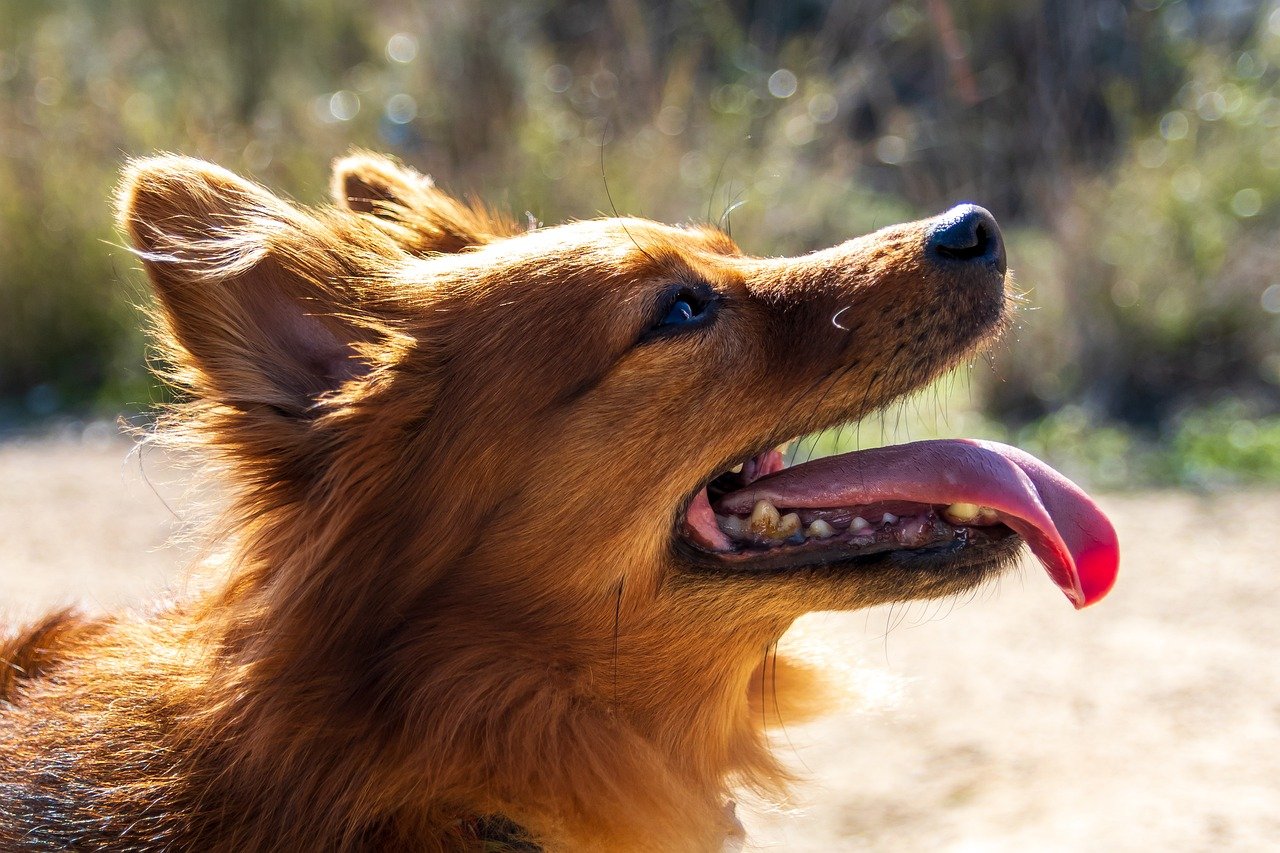
Nutritional Imbalances from Human Food
Feeding your beloved pet human food might seem like a harmless and even loving gesture, but it can lead to significant nutritional imbalances. Just as we need a balanced diet to thrive, our furry friends require specific nutrients to maintain their health and vitality. When we share our meals or indulge them with leftovers, we often overlook the fact that pets have different dietary needs than humans. For instance, while we might enjoy a hearty plate of pasta, that same dish could leave your pet feeling sluggish or even ill.
One of the biggest issues with feeding pets human food is the risk of nutritional deficiencies. Many pet owners may not realize that certain human foods lack essential vitamins and minerals that are crucial for a pet's health. For example, a diet heavy in meat without the necessary vegetables can lead to a lack of fiber, which is vital for a pet's digestive health. Similarly, feeding pets a diet high in carbohydrates from human food can result in obesity and other related health problems.
Moreover, the caloric content of human food is often much higher than what pets need. Dogs and cats have different metabolism rates, and what might be a standard serving for a human could be excessive for them. This can lead to weight gain, which is a precursor to numerous health issues, including diabetes and joint problems. To illustrate the difference, consider the following table that compares typical caloric intake for humans versus pets:
| Species | Daily Caloric Needs |
|---|---|
| Adult Human | 2,000 - 2,500 calories |
| Adult Dog (Medium-sized) | 600 - 1,200 calories |
| Adult Cat | 200 - 300 calories |
It's also important to recognize that some human foods can lead to toxic reactions. For instance, foods like onions, garlic, and avocados, which are perfectly safe for us, can be harmful to pets. The consequences of such imbalances can manifest in various ways, from gastrointestinal distress to more severe health issues like organ failure. This is why it's crucial to understand the specific dietary needs of your pet and avoid making assumptions based on what is safe for humans.
In conclusion, while it may be tempting to share your meals with your pets, it's essential to consider the long-term effects on their health. A diet that is not tailored to their unique nutritional requirements can lead to serious health risks. Instead, focusing on a balanced diet specifically formulated for your pet can help ensure they receive all the necessary nutrients without the dangers associated with human food.
The Role of Balanced Diets
When it comes to our furry companions, providing a balanced diet is not just a good idea; it's essential for their overall health and happiness. Think of your pet's diet as a carefully crafted recipe: each ingredient plays a vital role in creating a harmonious blend that supports their well-being. Just like you wouldn’t bake a cake without the right proportions of flour, sugar, and eggs, your pet requires a specific mix of nutrients to thrive.
A balanced diet for pets typically includes a variety of proteins, carbohydrates, fats, vitamins, and minerals. These nutrients work together to support various bodily functions, from maintaining a shiny coat to promoting strong bones. For instance, proteins are crucial for muscle development and repair, while fats provide energy and help absorb certain vitamins. Carbohydrates, on the other hand, serve as a quick energy source and aid in digestion.
Moreover, it's important to recognize that not all pets have the same dietary needs. Dogs and cats, for example, have different nutritional requirements. Dogs are omnivores and can thrive on a mix of meat and plant-based foods, whereas cats are obligate carnivores, meaning they require a diet high in animal protein. This distinction is vital when considering what to feed your pet. Feeding them a diet that doesn't align with their natural dietary habits can lead to health issues over time.
Here’s a quick breakdown of the essential nutrients your pet needs:
| Nutrient | Function | Sources |
|---|---|---|
| Proteins | Muscle development and repair | Meat, fish, eggs, legumes |
| Fats | Energy and vitamin absorption | Fish oil, chicken fat, flaxseed |
| Carbohydrates | Quick energy source | Grains, vegetables, fruits |
| Vitamins | Support various bodily functions | Fruits, vegetables, supplements |
| Minerals | Bone health and metabolic processes | Meat, dairy, leafy greens |
Incorporating these nutrients into your pet's diet can significantly enhance their quality of life. However, it’s not just about what you feed them; it's also about how much. Overfeeding or underfeeding can lead to obesity or malnutrition, both of which can have serious health consequences. Monitoring your pet's weight and adjusting their food intake accordingly is crucial.
So, how can you ensure that your pet is receiving a balanced diet? One effective way is to choose high-quality commercial pet food that meets the standards set by reputable organizations, such as the Association of American Feed Control Officials (AAFCO). These products are formulated to provide the necessary nutrients in the correct proportions, making it easier for pet owners to maintain their pets' health.
In conclusion, a balanced diet is the cornerstone of a healthy life for your pet. By understanding their unique nutritional needs and providing a diet that meets those needs, you can ensure that your furry friend remains happy, active, and healthy for years to come.
Understanding Pet Nutritional Needs
Understanding your pet's nutritional needs is like unlocking a treasure chest filled with health and happiness. Just as we have unique dietary requirements, so do our furry companions. Dogs and cats, for instance, are not just little versions of humans; they have distinct nutritional profiles that need to be met to ensure they thrive. A diet that works wonders for one species might be harmful to another. So, what do our pets really need?
Let’s break it down! Dogs are omnivores, which means they can eat a variety of foods, including meats, grains, and vegetables. However, while they can digest a wide range of foods, it doesn't mean they should. It's essential to provide them with a balanced diet rich in:
- Proteins: Vital for muscle development and overall health.
- Fats: A source of energy and necessary for healthy skin and coat.
- Carbohydrates: Provide energy and help with digestion.
- Vitamins and Minerals: Essential for immune function, bone health, and overall well-being.
On the other hand, cats are obligate carnivores, which means their diet must primarily consist of meat. Unlike dogs, they require certain nutrients that are only found in animal tissues, such as:
- Taurine: Crucial for heart and eye health.
- Arachidonic Acid: Important for skin health and reproductive functions.
- Vitamin A: Necessary for vision and immune function.
It’s not just about what they eat; it’s also about how much. Overfeeding can lead to obesity, which is a serious health risk for pets, just as it is for humans. Maintaining an appropriate portion size based on your pet's age, weight, and activity level is crucial. A good rule of thumb is to consult your veterinarian, who can provide tailored advice based on your pet's specific needs.
Moreover, pets can suffer from food allergies or intolerances, which can manifest in various ways, such as skin irritations, gastrointestinal upset, or behavioral changes. Keeping a close eye on your pet’s reaction to new foods can help identify any potential issues. If you notice any unusual symptoms, it’s time to revisit their diet and consult with a professional.
In summary, understanding your pet’s nutritional needs is not just a matter of choice; it’s a responsibility. By providing a balanced diet tailored to their specific requirements, you’re ensuring they lead a happy, healthy life filled with wagging tails and purring contentment. Remember, a well-fed pet is a happy pet!
Commercial Pet Food vs. Human Food
When it comes to feeding our beloved pets, the debate between commercial pet food and human food often sparks passionate discussions among pet owners. Many of us have been tempted to share our meals with our furry friends, thinking it's a way to show love and affection. However, it's crucial to understand that not all human foods are suitable for pets, and in many cases, they can be downright harmful. Commercial pet food, on the other hand, is specifically formulated to meet the dietary needs of pets, ensuring they receive the right balance of nutrients necessary for their health.
One of the primary advantages of commercial pet food is that it undergoes rigorous testing and regulation to ensure it is safe for consumption. Manufacturers create these foods with the help of veterinarians and pet nutritionists, focusing on the unique dietary requirements of different species and breeds. For example, dogs and cats have distinct nutritional needs, and commercial pet food is designed to address these differences effectively. In contrast, human food often lacks the essential nutrients that pets require, leading to potential health issues.
To illustrate the differences, let's take a look at a comparison between commercial pet food and common human food:
| Aspect | Commercial Pet Food | Human Food |
|---|---|---|
| Nutritional Balance | Formulated for specific life stages and health needs | Often lacks essential nutrients for pets |
| Safety | Regulated and tested for safety | Can contain harmful ingredients (e.g., chocolate, grapes) |
| Convenience | Easy to store and serve | Requires preparation and can lead to imbalances |
Furthermore, commercial pet foods come in various forms, including dry kibble, wet food, and even raw diets, catering to the preferences of both pets and their owners. These products are often enriched with vitamins, minerals, and other essential nutrients that promote overall health—something that is difficult to achieve with a human food diet alone.
While it is tempting to think that sharing our meals is a treat for our pets, the reality is that many human foods can lead to nutritional deficiencies or even toxic reactions. For instance, foods like onions, garlic, and certain spices can be harmful to pets, causing a range of health problems from gastrointestinal distress to more severe conditions. So, while that leftover pizza may seem like a fun snack for your dog, it’s essential to consider the long-term implications of such choices.
In conclusion, while the idea of feeding pets human food may come from a place of love, it is vital to prioritize their health by opting for commercial pet food that meets their specific nutritional needs. Always consult with a veterinarian before making any significant changes to your pet's diet to ensure they are receiving the best care possible.
Signs of Food-Related Health Issues
As a pet owner, it's crucial to be vigilant about your furry friend's health, especially when it comes to their diet. Just like humans, pets can experience a range of health issues due to inappropriate food choices. Recognizing the early on can make a world of difference in your pet's well-being. So, what should you look out for?
First and foremost, keep an eye on your pet's digestive health. Symptoms like vomiting or diarrhea can be immediate indicators that something is off in their diet. If your pet suddenly starts having frequent bouts of either, it might be a sign that they’ve ingested something they shouldn’t have, or that their food is not suitable for them. In such cases, it's essential to monitor their behavior closely and consider reaching out to your veterinarian.
Another important sign to watch for is changes in appetite. If your pet suddenly loses interest in their food or, conversely, seems excessively hungry, it could be a red flag. Pets that are experiencing food-related issues may also exhibit unusual thirst patterns. For example, increased thirst can often accompany certain dietary indiscretions or health issues, indicating that your pet's body is trying to cope with something amiss.
Moreover, you should pay attention to changes in your pet's energy levels. A drop in energy or unusual lethargy can be a sign that your pet isn't getting the right nutrients or is suffering from food intolerances. On the flip side, if your pet seems hyperactive or overly agitated, it may be due to consuming inappropriate foods that are high in sugar or caffeine, which can lead to a spike in energy followed by a crash.
Lastly, keep an eye on your pet's skin and coat health. A dull coat, excessive shedding, or signs of skin irritation can indicate nutritional deficiencies. Pets require a balanced diet rich in essential fatty acids for a healthy coat, and any changes in their fur could suggest that their diet is lacking vital nutrients. If you notice any of these symptoms, it’s always wise to consult with a veterinarian for a thorough examination.
In summary, being proactive about your pet's health involves observing their behavior and physical condition closely. If you notice any of the following signs, it may be time to reassess their diet:
- Vomiting or diarrhea
- Changes in appetite
- Unusual thirst
- Changes in energy levels
- Skin and coat issues
By being aware of these signs and maintaining open communication with your veterinarian, you can help ensure that your pet remains healthy and happy, free from the risks associated with inappropriate human foods.
1. Can I give my pet any human food?
While some human foods are safe for pets, many are not. Always research before sharing your food with your furry friend.
2. What are the signs that my pet is having a bad reaction to food?
Look for symptoms like vomiting, diarrhea, lethargy, changes in appetite, or skin issues.
3. Should I consult a vet before changing my pet's diet?
Absolutely! A veterinarian can provide tailored advice based on your pet's specific needs.
4. Are there safe human foods I can share with my pet?
Yes, certain foods like plain cooked chicken, carrots, and pumpkin can be safe and healthy options.
5. How can I make sure my pet is getting a balanced diet?
Opt for high-quality commercial pet food or consult your veterinarian for homemade diet plans that meet your pet's nutritional needs.

Alternatives to Human Food
When it comes to keeping our furry companions happy and healthy, it's essential to explore . While the temptation to share our meals with pets is strong, doing so can lead to a myriad of health issues. Fortunately, there are plenty of safe and nutritious options available that can satisfy your pet's cravings without the risks associated with human food. Imagine your dog's tail wagging with excitement as you present a tasty, pet-friendly treat instead of a leftover from your dinner plate!
One of the best approaches is to focus on commercial pet treats and snacks specifically formulated for pets. These products are designed with your pet's health in mind, ensuring they receive the right nutrients without harmful ingredients. When selecting treats, look for those that contain high-quality proteins, healthy fats, and essential vitamins and minerals. Always check the ingredient list for any potential allergens and avoid anything with artificial additives.
But what if you want to get creative and whip up something special at home? Making homemade pet treats can be an enjoyable activity that strengthens the bond between you and your pet. Simple recipes using wholesome ingredients can provide a fun and nutritious alternative to human food. For instance, you can create treats using ingredients like pumpkin, peanut butter, and oats, which are not only safe but also healthy for your pet. Here’s a quick recipe to get you started:
| Ingredients | Quantity |
|---|---|
| Whole wheat flour | 2 cups |
| Pumpkin puree | 1 cup |
| Peanut butter (unsweetened) | 1/2 cup |
| Egg | 1 |
| Water | As needed |
To make these treats, simply mix all the ingredients in a bowl until they form a dough. Roll out the dough and cut it into fun shapes using cookie cutters. Bake at 350°F (175°C) for about 20-25 minutes or until golden brown. Let them cool before serving. Your pet will love these homemade goodies!
However, before making any significant changes to your pet's diet, it’s crucial to consult a veterinarian. A professional can provide tailored advice based on your pet’s specific health needs and dietary requirements. They can help determine which treats are suitable and how to incorporate them into your pet's daily routine without causing any imbalances. Remember, just because something is safe for one pet doesn't mean it’s safe for another; each pet is unique!
In conclusion, while sharing human food with our pets might seem like a sign of love, there are far better alternatives that can keep them healthy and happy. From commercial treats to homemade options, there's a world of safe snacks out there waiting to be discovered. So next time you think about sharing your plate, consider treating your pet to something designed just for them instead!
- Can I give my pet fruits and vegetables? Yes, many fruits and vegetables are safe for pets, but always check which ones are appropriate. For example, carrots and apples are great snacks, while grapes and onions should be avoided.
- What should I do if my pet accidentally eats something harmful? If you suspect your pet has ingested something toxic, contact your veterinarian immediately or call an animal poison control hotline.
- How often can I give my pet treats? Treats should only make up about 10% of your pet's daily caloric intake to maintain a balanced diet.
Homemade Pet Treats
Creating can be a delightful and rewarding experience for both you and your furry friend. Not only does it allow you to control the ingredients, ensuring that your pet is getting the best nutrition possible, but it also provides a fun way to bond with your pet. Imagine the joy in your dog's eyes when you whip up a batch of tasty biscuits just for them! However, it’s essential to keep in mind that not all human foods are safe for pets, so let’s explore some simple and healthy recipes that will keep your pets wagging their tails in delight.
When crafting homemade treats, you can use common ingredients that are both safe and nutritious for your pets. For example, oats, pumpkin, peanut butter (make sure it’s xylitol-free!), and sweet potatoes are all excellent choices. Here’s a quick recipe for peanut butter and pumpkin dog biscuits that your pup will love:
Ingredients: - 1 cup whole wheat flour - 1/2 cup canned pumpkin - 1/4 cup peanut butter (xylitol-free) - 1/4 cup water - 1 egg
To make these delicious treats, simply mix all the ingredients in a bowl until they form a dough. Roll it out on a floured surface, cut it into fun shapes with cookie cutters, and bake them at 350°F (175°C) for about 20-25 minutes. Let them cool before serving. Your pet will appreciate the effort, and you’ll feel good knowing exactly what’s in their treats!
Moreover, you can also experiment with different flavors and textures to keep your pet excited about snack time. For example, adding mashed bananas or shredded carrots can provide extra nutrients and flavors. Just remember, moderation is key! Treats should only make up about 10% of your pet’s daily caloric intake to maintain a healthy diet.
If you’re wondering about portion sizes, consider your pet’s size and activity level. Smaller pets may only need a small bite-sized treat, while larger dogs can handle a more substantial snack. Always observe your pet’s reaction to new treats, and discontinue any that cause digestive upset or allergic reactions.
In addition to baking, you can also create no-bake treats that are quick and easy to prepare. For example, you can mix rolled oats with peanut butter and a splash of honey, then roll them into balls and refrigerate them. This method is not only simple but also allows you to whip up a batch in no time, perfect for those last-minute snack cravings!
As you embark on your homemade treat journey, remember that consulting with a veterinarian is always a good idea, especially if your pet has specific dietary needs or restrictions. They can provide tailored advice on ingredients that are safe and beneficial for your pet's health.
In conclusion, homemade pet treats are a fantastic way to show your love for your furry companions while ensuring they receive nutritious snacks. With a little creativity and some safe ingredients, you can make treat time a special occasion. So why not give it a try? Your pets will thank you with wagging tails and happy purrs!
- Can I use any type of flour for homemade pet treats?
While whole wheat flour is commonly used, some pets may have allergies to wheat. Alternatives like oat flour or almond flour can be good substitutes. - How long can I store homemade treats?
Homemade pet treats can typically be stored in an airtight container for about a week. For longer storage, consider freezing them. - Are there any foods I should avoid when making treats?
Yes! Ingredients like chocolate, grapes, onions, and garlic are toxic to pets and should always be avoided.
Consulting a Veterinarian
When it comes to your beloved pets, their health and well-being should always be your top priority. One of the most effective ways to ensure that your furry friends are getting the right nutrition is by . These professionals are not just doctors for animals; they are your go-to guides in navigating the often confusing world of pet nutrition. Just like we wouldn’t self-diagnose our health issues, it’s crucial to seek expert advice regarding your pet's diet.
Veterinarians can help you understand the unique dietary needs of your pet, whether it's a dog, a cat, or even a more exotic animal. They can provide insights into what foods are safe and beneficial, and which ones might pose risks. For instance, did you know that certain human foods can be downright toxic to pets? A vet can help you identify these dangers and suggest alternatives that are both safe and nutritious.
Moreover, a veterinarian can assess your pet's health condition and recommend a diet tailored specifically to their needs. This is particularly important for pets with underlying health issues, allergies, or special dietary requirements. For example, if your dog is overweight, your vet might suggest a weight management plan that includes specific types of food and portion sizes to help them shed those extra pounds safely.
It’s also worth noting that not all commercial pet foods are created equal. A vet can help you decipher pet food labels, guiding you on what to look for in terms of ingredients and nutritional value. They can recommend high-quality brands that meet the standards necessary for your pet’s health, ensuring that they receive balanced nutrition without harmful additives.
In addition to dietary advice, regular check-ups with your veterinarian can help monitor your pet's overall health and catch any potential issues early on. This proactive approach can save you time, stress, and money in the long run. Remember, just as we benefit from regular health check-ups, our pets do too!
In summary, consulting a veterinarian is not just a good idea; it's essential for ensuring your pet leads a healthy and fulfilling life. They can provide the guidance you need to make informed decisions about your pet's diet and health, keeping them happy and thriving for years to come.
- How often should I consult my veterinarian? It's recommended to have annual check-ups, but consult your vet more frequently if your pet has health issues.
- What are some signs my pet might need a dietary change? Look for changes in weight, energy levels, or digestive issues. If you notice any of these, consult your vet.
- Can I feed my pet homemade food? Yes, but it's crucial to consult your vet to ensure that the homemade diet meets all of your pet's nutritional needs.
- Are there any human foods that are safe for pets? Some human foods, like certain fruits and vegetables, can be safe. Always check with your vet before introducing new foods.
Frequently Asked Questions
- Can I feed my pet human food?
Feeding pets human food can be risky. Many human foods are toxic to animals, such as chocolate, grapes, and onions. It's essential to research which foods are safe and which are harmful before sharing your meals with your furry friends.
- What are the signs that my pet is having a food-related issue?
Common signs of food-related health issues in pets include vomiting, diarrhea, lethargy, and changes in appetite. If you notice any of these symptoms after introducing new foods, it’s crucial to consult your veterinarian.
- How can human food lead to nutritional imbalances?
Human food often lacks the essential nutrients that pets need for optimal health. Feeding them a diet primarily composed of human food can lead to deficiencies, affecting their energy levels, coat health, and overall well-being.
- What should I consider when choosing a diet for my pet?
When selecting a diet for your pet, consider their age, size, breed, and specific health needs. A balanced diet that meets their nutritional requirements is crucial for maintaining their health and preventing issues down the line.
- Are there safe alternatives to human food for pets?
Absolutely! There are many safe and healthy alternatives to human food. Options like carrots, apples, and specially formulated pet treats can provide your pets with tasty snacks without the risks associated with human food.
- Can I make homemade treats for my pet?
Yes! Making homemade pet treats can be a fun and healthy option. Just ensure you're using pet-safe ingredients and following recipes that cater to their specific dietary needs.
- Why is consulting a veterinarian important for my pet's diet?
Veterinarians can provide tailored advice based on your pet's unique health requirements. They can help you understand the best dietary choices and identify any potential risks associated with feeding them human food.


